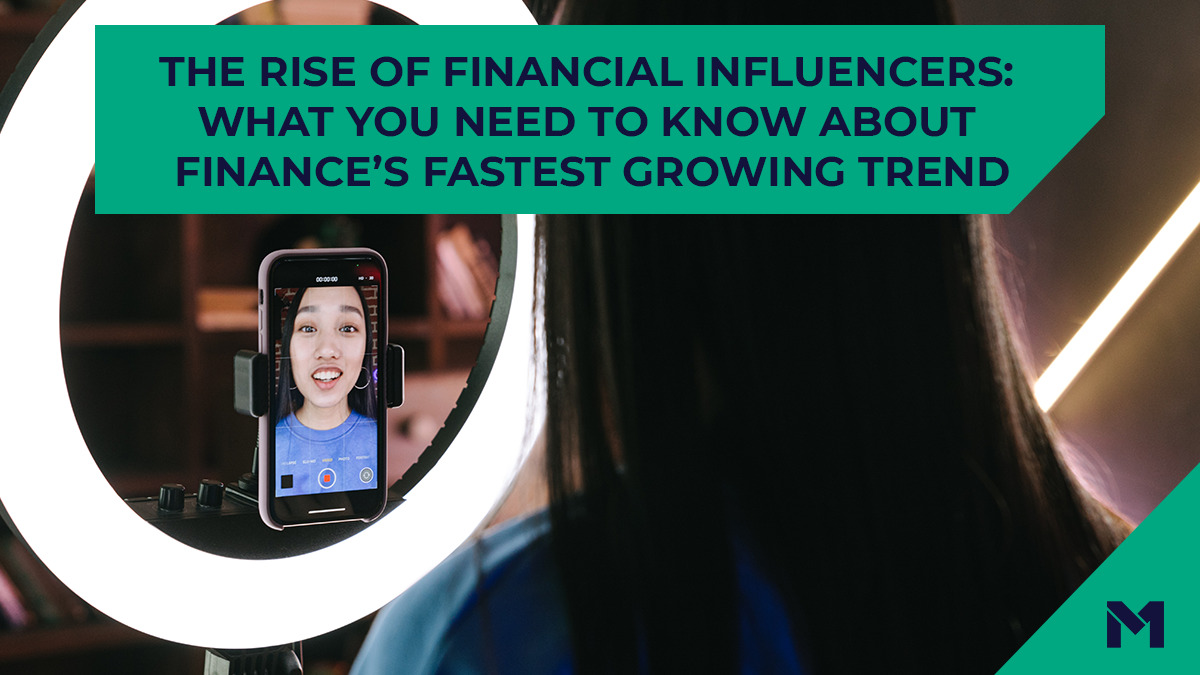The rise of financial influencers: what you need to know about finance’s fastest growing trend

The last time I wrote a post, we were in the middle of what financial historians might call the “Meme Coin Rush of 2021.” As I wrote back in April, “you can’t build long-term, sustainable wealth by being cavalier about it.”
Dogecoin is down more than 35% since that post was published. And another related trend remains on the upswing: social media being more saturated with financial content than ever before. This takes shape in many forms:
• Financial influencers are giving their “Five stock picks that will go to the moon in 2022.”
• How to pay off your house by 30.
• Savings and budgeting challenges.
• Stories of how people paid off tens (or hundreds) of thousands of dollars in student loans using their simple tips.
A simple search of #financialtips on TikTok brings up results that range from helpful to disastrous. It can be downright confusing when helpful videos like “Top Five Books for Financial Freedom” pop up next to reckless content titled “Do Not Pay Your Collections.”
So, how did we get here? Let’s look at the rise of financial content on social media, its pros, and cons, and takeaways to make sure you’re smartly investing for the future.
The rise of financial influencers and why people keep tuning in
While publications like the Wall Street Journal and Forbes were once the primary sources of financial information for many, social media is one of the key sources that younger generations are turning to for investment information. Just look at this stat from a recent study conducted by Motley Fool: “91% of Gen Z and 75% of millennial respondents used social media for information on investing, more than any other source of information.”
How is that number so high?
Many have attributed this rise to financial content becoming easily digestible. Bite-sized content is a key reason that social media became so popular in the first place.
Most members of the younger generations don’t want to attend weekend-long financial conferences. They don’t want to crack open a 500-page finance book either. They feel like they can acquire the same information quickly, for free, and whenever they want to by opening up their smartphone.
“91% of Gen Z and 75% of millennial respondents used social media for information on investing, more than any other source of information.”
MOTLEY FOOL – “Gen Z and Millennial Investors: Ranking the Most Used, Trusted Investing Tools”
A surplus of financial content online
Americans spend an average of two hours and three minutes per day on social media. That is a lot of content when you consider character and time limits.
Finfluencers, the moniker given to financial influencers, have an opportunity to cultivate massive audiences and reel in high income by churning out content. Bloomberg touched on this exact phenomenon when last month, they profiled a 25-year-old who was able to turn his financial TikTok channel into a full-time career that brings him $500,000 a year.
This kind of potential for creators has created an endless supply of personal finance accounts. And with this much content out there, it not only reaches those who seek it out but also those who are scrolling for sports highlights or videos of puppies.
Fresh content for a new generation of investors
This audience is turning to social media platforms because much of the online financial content targets an older, wealthier audience. Many young people can’t relate to this content.
The rise in financial influencers has led to many people seeing themselves represented for the first time in financial content. LGBTQ+ individuals and women of color, to name a few, are seeing themselves represented in a space that has long been homogenous.
Morning Consult found that 71% of Gen Z and millennials responded that they’re prioritizing “getting advice from someone like me.” This is 11% higher than the average response from all generations.
While brokerages and legacy outlets heavily target wealthy investors, financial influencers are on the hunt to cultivate an audience and achieve a high volume of views.
How M1 works with influencers
It’s not a secret that we work with many influencers and affiliates across the finance and non-finance spaces. Working with these partners helps us reach people who weren’t previously aware of M1, talk to new demographics in an authentic way, and educate clients on how to use M1 through people they already trust.
This helps us with legitimacy and trust, which is super important for a finance brand. This also allows us to work closely with people passionate about personal finance and have an audience that shares that same passion.
But we’re also hyper aware that working with external partners introduces risks to both ourselves, our partners, and our clients. So, our programs are invite-only. This lets us better vet anyone we work with, and make sure they align with our values. We regularly review and audit content to make sure it’s up to the highest standards.
And, we provide our partners with educational resources about our platform and industry. These checks and balances help us responsibly grow our influencer program, platform, and spread of smart personal finance education.
If you’re a passionate creator talking about personal finance, wellness, career, or lifestyle, we’d love to hear from you.
Stay safe while scrolling
There are always two sides to a story. And for all the positives that we laid out, there are negatives to receiving your investment advice from social media when content spans from helpful to somewhat flawed, to seriously inaccurate and even harmful financial advice.
Let’s look at a few common pitfalls to be aware of and explore how to consume financial content on social media safely.
Lots of misinformation, no regulation
Due to a lack of regulation or oversight of any kind, creators are not held to the same standard that financial institutions are. Since they don’t have a fiduciary responsibility to their viewers, some creators prioritize viral posts (and their financial benefits) over providing accurate information. That’s why it’s crucial to find creators who are looking to educate and lend sound advice.
On top of that, it’s not just PhDs and financial planners handing out advice. Anyone can sign up for these platforms and begin proclaiming themselves a financial expert. While some creators acknowledge that they aren’t licensed, some don’t. However, people scrolling may not realize the difference.
And since these content creators are building brands as financial wizards, you won’t see them post about failed strategies or stock picks that sent portfolios sideways. You’ll see the picks that worked out.
It’s like a highlight of a basketball game. You’re not going to see the missed free throws, timeouts, or out-of-bounds plays. You’re going to see jaw-dropping dunks and game-winning shots. The same rings true with some financial influencers. So, don’t compare your whole investing career to their investing highlight reel. They’re the editors and choose what makes the cut (and what is left out) on their platforms.
Over-simplification
A lot of worthwhile financial concepts can’t be described in a single Instagram post or TikTok.
Maxing out your employer match on your 401k doesn’t sound as exciting as learning about the “next cryptocurrency that could make you a millionaire.” One is considered by many to be a tried-and-true strategy for building wealth, and one is akin to walking into a casino and putting your money on red at the roulette table. So many financial influencers simplify the topic, and some don’t even mention that there can be nuances and huge risks.
One size fits all
While viral financial topics are undoubtedly fun, they don’t always fit your unique strategy or goals.
Take NFTs or the hottest new meme coin, for example. Exciting and new? Absolutely. A sound strategy for most investors? Probably not.
What’s right for a 59-year-old with a high income, two kids in college, and retirement on the brain might not be what’s right for a 23-year-old who is working their first job out of college and trying to build up their emergency fund.
Are social media algorithms getting smarter? Absolutely. But they’re still not at the point of differentiating content with this level of specificity or accuracy.
When consuming this content, view it through the lens of education, not advice. Be sure to vet the information with other sources and ensure that it is the right advice for your unique situation. There are factors including income, expenses, savings, risk tolerance, and many others to consider when looking at your financial planning.
The best investment and financial strategies are uniquely tailored to you. They consider your goals, income, investments, risk tolerance, values, and what you hope to accomplish and experience.
No matter what social media platforms you turn to for help with your finances, the most trustworthy creators you’ll find are those who are candid about your need for specific advice. They should be open about this fact. They shouldn’t sell a broad strategy claiming that it works for everyone. So, avoid accounts that give you their hottest stock picks for the moment and seek out transparent financial education.
And if you ever need to double-check someone’s credentials, there are easy-to-use resources provided by FINRA and the SEC.
5 ways we think about financial information online
- If something you see piques your interest, do your research before applying that strategy or stock pick. You’ve heard people say this your whole life, but when things sound too good to be true, they usually are.
- Know why you’re making the decisions you make. Financial advice is not one size fits all. It needs to be tailored to each individual, so don’t let the only reason be that someone online said it was the right thing to do.
- Check on the credentials of the people you’re getting financial advice from. Followers and expertise do not go hand-in-hand. Just because someone has many followers, it doesn’t mean that their advice is sound.
- Avoid clickbait! Anyone who says “secrets to financial success” or speaks in absolutes is better as an entertainer than a trusted financial voice.
- Good advice isn’t always exciting. Reading about a 12-layer chocolate cake might be more fun than reading about the benefits of carrots. The same applies to finances.
Social media can be a great way to learn about new financial topics and concepts. Still, it’s important to do your homework and ensure that the information you receive is right for you.
Especially if you’re a younger investor, focus on learning about the key pillars of financial literacy. This will help you much more in the long run than searching for the next “to the moon” stock pick. Nobody knows what individual stocks or investments might do in the future but being financially literate will always help you navigate your finances. Prioritize content related to savings, keeping a budget, and other generally accepted financial principles. These have stood the test of time.
Stay the course, reap the rewards
As a long-term investor, there will always be plenty of distractions along the way. It’s important to stay focused. Whether it’s a recent phenomenon, like Dogecoin or a TikTok that promises 10x returns, or an older phenomenon, like mass withdrawals surrounding Y2K, there will always be distractions.
Nobody is immune from these distractions.
But there are principles for financial wellness that have been proven successful for decades. Those are the principles we follow. Live below your means, stay diversified with your investments, have an emergency savings fund, avoid high-interest debt, and regularly contribute to your portfolio.
Enjoy financial influencers on TikTok (and other platforms) for what they are. They’re entertaining, use new venues for financial content, and can introduce you to financial concepts. When they make these introductions, do your research with trusted sources before changing your portfolio or habits.
The most rewarding things in life take time, effort, and discipline. Finances are no different in this way than your health or relationships. Shortcuts are flashy but fall short. Stay the course, and we’ll be there with you at every step of the journey.
- Categories
- Plan



